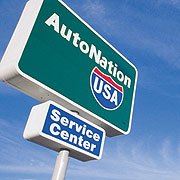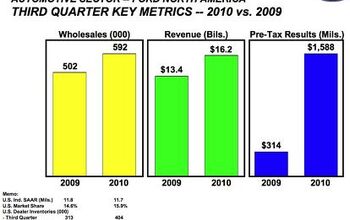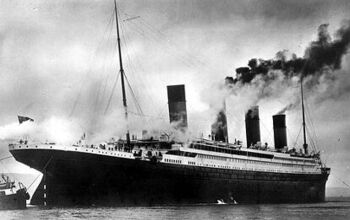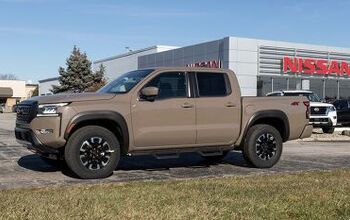3 Views
AutoNation Reports $1.4b Q3 Loss

by
John Horner
(IC: employee)
Published: November 6th, 2008
Share
AutoNation’s third quarter 2008 financial release is more grim news. The US’ largest automotive retailer reported “a 2008 third quarter net loss from continuing operations of $1.40 billion or $7.95 per share.” Total sales revenue was down 22%, driven by a new vehicle unit sales decline of 24%. Overall industry unit sales for the period were down 31%, a set of numbers consistent with the observation that smaller dealerships are going belly up. As one of the big boys, AutoNation is doing a little better than the averages. We know that the small, and some not so small (Bill Heard, groan) dealerships are dropping like proverbial flies. AutoNation’s press release provides commendable detail on the domestic brand, import brand and premium luxury business segments. No real surprises there. Domestic brands got whacked with a 57% revenue decline while import brands and “premium luxury” both dropped 23%. The usual suspects of tight credit markets, high fuel costs and scarred silly non-buyers are duly noted. Operations wise, AutoNation squeezed out a $159 million profit for the quarter compared to $226 million in 2007’s equivalent period, a 29% drop off largely inline with the revenue hit. Why then the huge reported loss?: Value of the company’s domestic branded franchises. These dealerships were bought from small groups and owner-operators over the years. When purchased, the amount of the purchase price in excess of the real estate, inventory and any other hard assets of the business was booked as “goodwill and/or franchise” value. Today market value for a domestic branded car dealership is zero, so AutoNation had to write off $1.46 billion in recognition of the new reality. If and when those values ever go back up, AutoNation will be able to book an upside … but let’s not hold our breath.

John Horner
More by John Horner
Published November 6th, 2008 6:32 PM
Latest Car Reviews
Read moreLatest Product Reviews
Read moreRecent Comments
- Jeff “So, the majority of our products are either ICE vehicles or intended to utilize those multi-energy platforms that we have. This is a great opportunity for us, compared to our peers, having the multi-energy platforms for all of our products in development and having the agility to move between them,” she said. From what is stated about the next generation Charger it will be released as a 2 door EV and then as a 4 door with the Hurricane turbo straight 6. I assume both the 2 door and 4 door is on the same platform.
- Brendan Duddy soon we'll see lawyers advertising big payout$ after getting injured by a 'rogue' vehicle
- Zerofoo @VoGhost - The earth is in a 12,000 year long warming cycle. Before that most of North America was covered by a glacier 2 miles thick in some places. Where did that glacier go? Industrial CO2 emissions didn't cause the melt. Climate change frauds have done a masterful job correlating .04% of our atmosphere with a 12,000 year warming trend and then blaming human industrial activity for something that long predates those human activities. Human caused climate change is a lie.
- Probert They already have hybrids, but these won't ever be them as they are built on the modular E-GMP skateboard.
- Justin You guys still looking for that sportbak? I just saw one on the Facebook marketplace in Arizona


































Comments
Join the conversation
Two interesting items to watch: One: "Third quarter Domestic retail new vehicle unit sales declined 36%. In comparison, U.S. industry Domestic retail new vehicle unit sales declined 33% according to CNW Research. Third quarter Import retail new vehicle unit sales declined 18%. In comparison, U.S. industry Import new vehicle retail unit sales declined 26% according to CNW Research." Looks like improts are still half alive at Autonation, compared with Domestics that took a much bigger hit (and from the October numbers trickling in, will be on the mat.) Autonation doesn't seem to agree with CNW on the import numbers .... Two: The huge writeoff for goodwill is interesting. Goodwill is an accountant's play-doh. Times are bad. These days, you are suprising nobody with an "Ouch!" to the common question "How's business?" Expect everybody to round up all financial sceletons tucked away in the lateral file cabinets, and write them off. "Hey, times are bad!" We'll have accrued losses for years to come. Tax revenue will go down the tubes. Maybe Obama will change his mind. Who wants that kinda job?
what of asbury auto? another mega dealer holding company. http://www.asburyauto.com/home.aspx